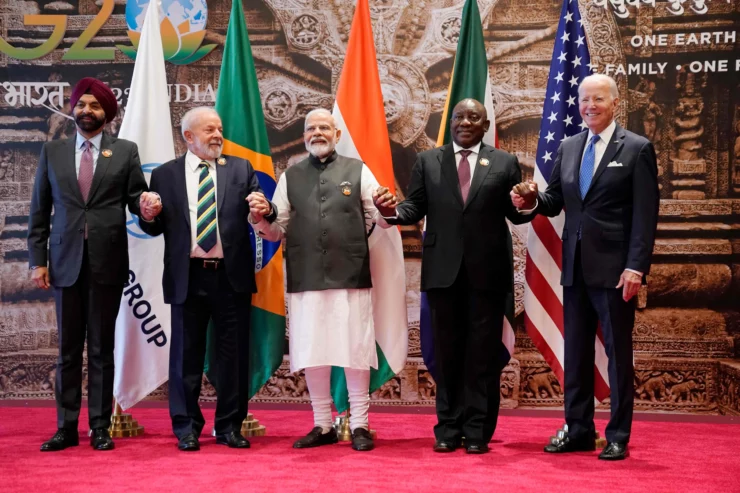
India led the 18th G20 Summit from September 9–10, 2023, in New Delhi for the first time. India has worked to depoliticize the discussion and keep everyone’s attention on critical topics such as energy, climate change, food security, and global financial, and economic stability as a responsible and significant state from the very beginning of its presidency.
The G7 nations, particularly the United States, applied significant pressure to the Indian leadership to reflect reasonable positions in the final G20 event documents. These positions included criticism of Russia’s actions and the situation in and around Ukraine. The G7 nations even made an attempt to smuggle the Ukrainian president into the summit. However, these ambitious goals were not met. The Indians stood their ground and made efforts to depoliticize the discussions as much as possible and reduce them to a discussion of the economic mandate of the forum, which they largely succeeded in doing.
The country’s presidency of the G20, according to Indian Prime Minister Narendra Modi, is a convenient opportunity to demonstrate to the world community New Delhi’s growing role as one of the important centers of the emerging new world order and economic development. India is currently the fifth-largest economy in the world and one of the top countries in terms of GDP growth. In the near future, the country hopes to move up to the third spot with an annual growth rate of 8%. The country’s GDP currently stands at $3.75 trillion dollars. The success of the summit was important for India not only in terms of demonstrating its economic power and high prestige in the international arena as a large and balanced player but also for domestic political reasons, taking into account the upcoming parliamentary elections in the country, where the ruling alliance led by Narendra Modi will be opposed by united opposition forces led by the party of Sonia Gandhi, the Indian National Congress.
Of course, Indians were disappointed that the leaders of China and Russia did not visit New Delhi, but on the other hand, it enabled them to overcome many challenges, including political and protocol ones, in the midst of the acrimonious conflict between the West and Russia, and the burgeoning rapprochement between China and Russia.
India has made great efforts to ensure that the G20 events do not feature anti-Russian and anti-Chinese rhetoric and do not add to the atmosphere of confrontation, given its consistent course of strengthening its strategic partnership with Russia and equalizing its difficult relations with China, which include territorial issues. It must be acknowledged that this mission was substantially completed due to the diplomacy prowess of India. The final declaration that was accepted, which had a compromise and largely neutral language on the circumstances in and surrounding Ukraine, represented a turning point and improved the nation’s reputation as an impartial participant seeking solutions to the most challenging global issues. The African Union’s joining the G20 at the summit and confirmation of support for the well-known grain deal were notable. The popularity of Narendra Modi has increased as a result of all of this, which is important for him in the context of domestic politics.
In conclusion, it can be said that India has successfully handled the demanding duties as the chair of the G20. It is clear that it has to balance its foreign policy, actively developing relations with the United States and the European Union, but at the same time, New Delhi is committed to strengthening cooperation with Russia, including within the framework of BRICS and SCO.
The author, on the other hand, was once more persuaded by the example of the outcomes of the G20 meeting in New Delhi that, despite the significant pressure applied to it by Westerners, Russia has a dependable and balanced partner represented by India, which is interested in establishing a new, fairer, and more democratic multipolar world order.
Anvar Azimov, Ambassador Extraordinary and Plenipotentiary, Senior Research Fellow of MGIMO, exclusively for the online magazine “New Eastern Outlook.”